#social satire
Text
rejoice, rejoice (performative white liberalism is once again being shown no mercy in the most unrelenting media damnation of it this horror-loving black woman has seen since 'get out') !!
'the curse' is the first white-helmed production i have ever seen that relentlessly and unapologetically interrogates the insidious nature of white, performative liberalism. rather than appealing to the white man's ego, it aims to make the offending party as uncomfortable as possible. no space is allowed for white fragilities. to the contrary, the tv series indignantly elucidates and condemns the acts of racism, gentrification, classism, and other forms of bigotry hidden under the guise of liberal niceties and ideology to garner social praise and adoration perpetrated by purported white allies.
i was reminded of my first experience watching 'get out' (2017) within MINUTES of beginning the pilot episode: feelings of sheer vindication and validation from watching performative white people FINALLY be stripped of the approving savior trope most pieces of media put forth by white people embrace. instead, whitney and asher siegel, the show's ostensibly benevolent home improvement show power couple (think chip and joanna gaines but more environmentally conscious and philanthropic...or so they say) who, beneath the guise of performativity, seek only to serve themselves financially and socially, are portrayed as the monsters they truly are. returning to 'get out,' this film also sought to elucidate the way a marginalized group- black people- experiences said marginalization through implicit manifestations engendered from white "etiquette," as best encapsulated by the sunken place.
it was wonderful to see the ever stupendous, inimitable emma stone (i see a second oscar and first emmy in her very near future!) and incredible nathan fielder commit themselves fully to the exposé of white-perpetrated atrocities of the self-proclaimed liberal variety, both in front of the camera and behind the scenes as executive producers, the latter also as a writer and creator. one must actively de-center their whiteness and place their ego ("but not ALL white people!!") aside to deliver such an accurate performance and play a role in developing a show of this nature. many of their white counterparts fail to truly garner the values of social justice needed to undertake these responsibilities.
so from a black woman who loves the premise of the horror/thriller genre being utilized as a creative medium to expose the true horrors of society- systemic oppression- shout out to everyone involved in this riveting piece of desperately needed social critique.
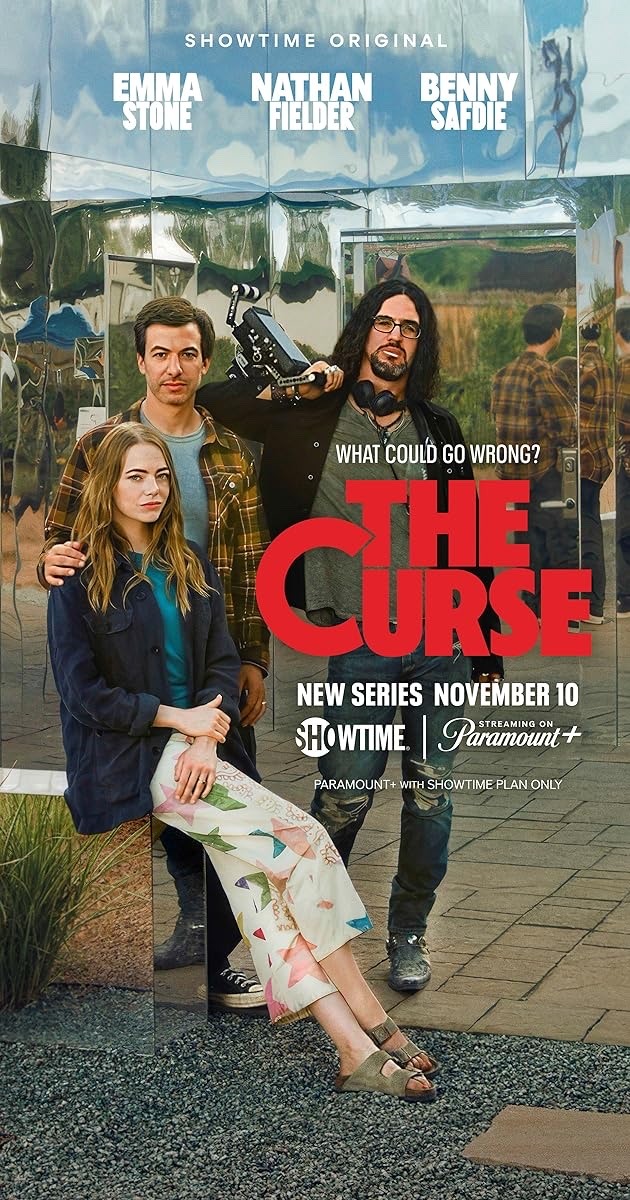
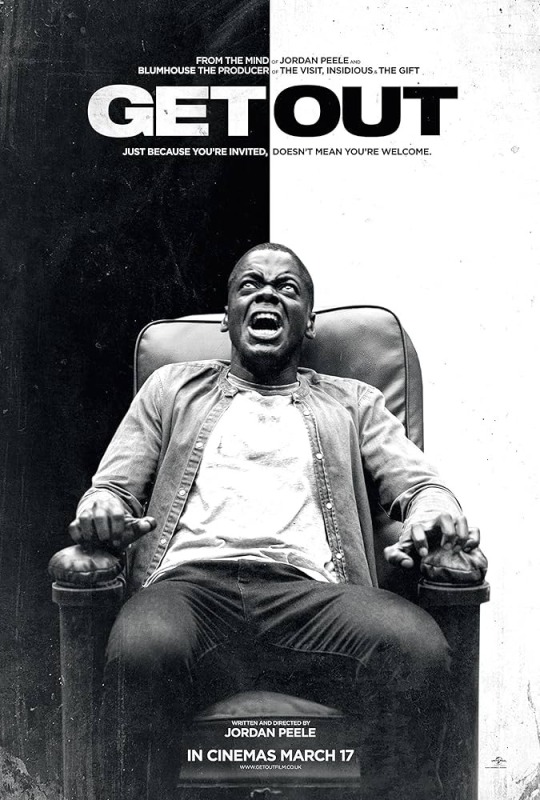
#emma stone#nathan fielder#the curse#racism#gentrification#social critique#social satire#social commentary#social justice#jordan peele#get out#tv analysis#film analysis#horror#psychological thriller#thriller#performative activism#performative allyship#white fragility#white saviorism#white savior complex
49 notes
·
View notes
Photo


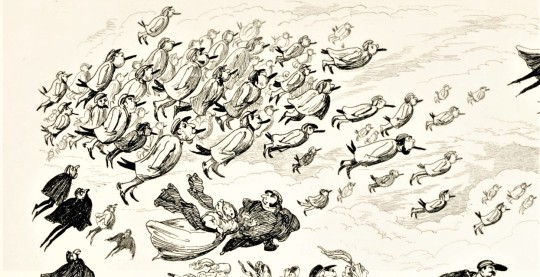

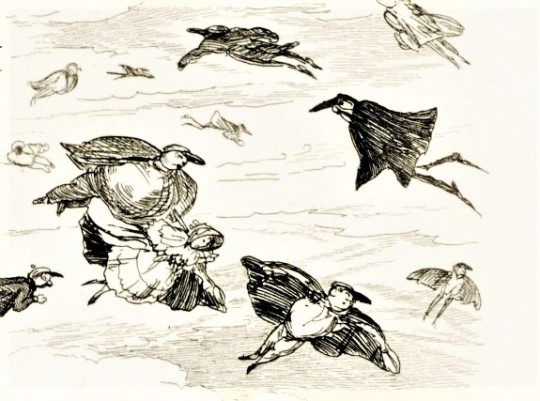

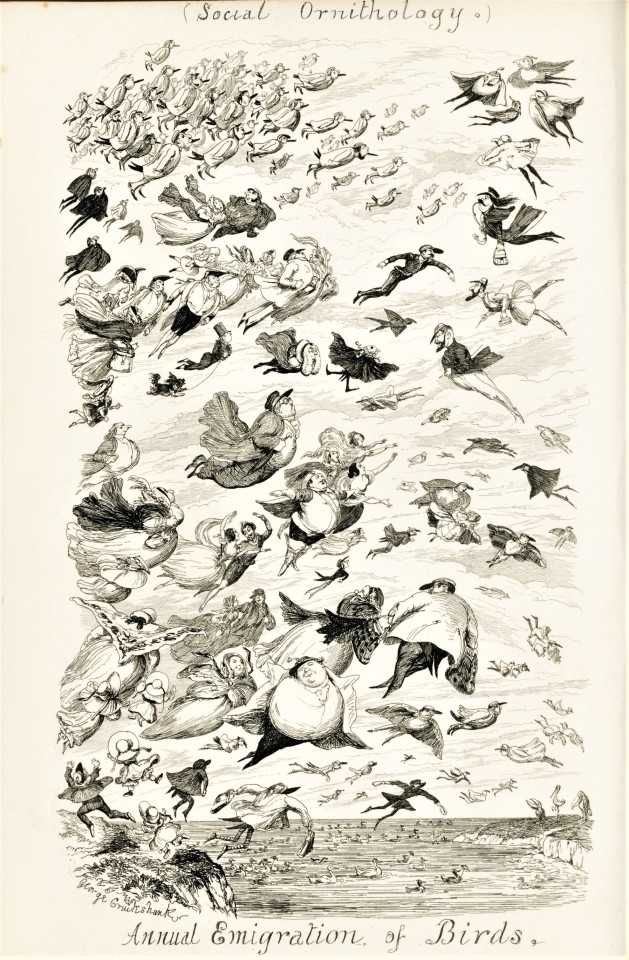


A Cruikshank Feathursday
As part of a recent gift from Frederick Vogel III, we received a copy of George Cruikshank's Table-Book, edited by English humorist Gilbert Abbott à Beckett (1811-1856), illustrated by English caricaturist and book illustrator George Cruikshank (1792-1878), and published in London by the British satirical magazine Punch in 1845. Among the scores of ridiculous illustrations is a steel engraving titled “Annual Emigration of Birds” illustrating a short article entitled “Social Zoology -- Ornithology” in which à Beckett equates various segments of English society to species of birds, including Vultures (”always pouncing upon others”), Hawks (”whose prey is the pigeon”), Boobies (”walks with difficulty, and in fact can’t get on”), and Spoonbills (”a sort of adjutant to the Wild Goose . . . going frequently on Wild Goose errands”).
View another post with illustrations by George Cruikshank.
View more Feathursday posts.
#Feathursday#George Cruikshank#Gilbert Abbott à Beckett#George Cruikshank's Table-Book#Punch Magazine#social ornithology#satire#social satire#caricatures#steel engravings#Frederick Vogel III#birds#birbs!
65 notes
·
View notes
Photo
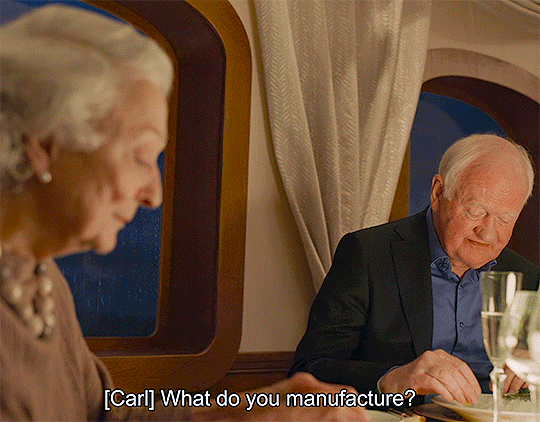




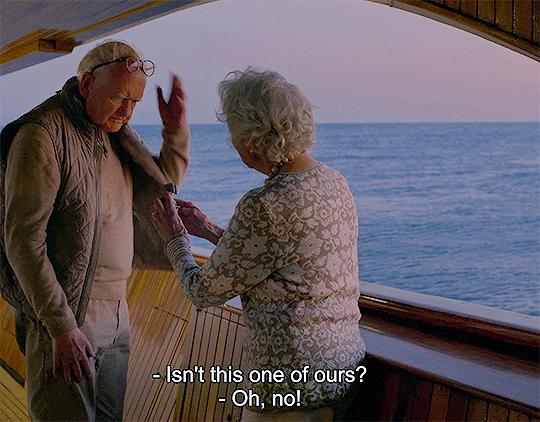
😂😂😂 · Triangle of Sadness (2022 𝖿іᥣm)
ძіr. rᥙᑲᥱᥒ ös𝗍ᥣᥙᥒძ · ძᥲrk ᥴ᥆mᥱძᥡ · ᥴᥲ⍴і𝗍ᥲᥣіsm · s᥆ᥴіᥲᥣ ȷᥙs𝗍іᥴᥱ
#filmedit#triangle of sadness#social satire#merchants of death#anti capitalism#filmgifs#film#ruben östlund#triangle of sadness 2022#oliver ford davies#amanda walker#arms dealers#weapons manufacturing#defense industry#anti capitalism explained#military industrial complex#moviegifs#movie
108 notes
·
View notes
Quote
Robin Hood is king of the forest both by dignity of birth and by virtue of his standing army: to say nothing of the free choice of his people, which he has indeed, but I pass it by as an illegitimate basis of power.
Thomas Love Peacock, Maid Marian (1822)
#supreme executive power derives from a mandate from the masses#there's an even more explicitly socialist bit earlier about distributive justice#all of this makes much more sense when one realizes the author was pals with the shelleys#anyway#a very strange little novel#walter scott parody#greenwood shenanigans#social satire#combined and stirred#maid marian 1822#thomas love peacock#book quotes
42 notes
·
View notes
Text
Unveiling Social Constructs: A Review of "Pygmalion" by Bernard Shaw

Bernard Shaw's "Pygmalion" is a thought-provoking play that transcends time, weaving together themes of class, identity, and societal expectations with wit, humor, and insight. First performed in 1913, the play follows the transformative journey of Eliza Doolittle, a Cockney flower girl, who becomes the subject of a bet between the phonetics professor Henry Higgins and Colonel Pickering. As Higgins attempts to mold Eliza into a refined lady through speech lessons, "Pygmalion" explores the intricacies of language, social mobility, and the power dynamics inherent in class distinctions.
At its core, "Pygmalion" challenges the notion of fixed social hierarchies and underscores the arbitrary nature of class distinctions. Shaw deftly exposes the absurdity of equating social status with inherent worth, presenting characters whose true value lies not in their birthright but in their character and individual agency. Through Eliza's transformation from a humble flower girl to a confident, independent woman, Shaw highlights the fluidity of identity and the potential for self-determination, regardless of one's social origins.
Moreover, "Pygmalion" is a testament to Shaw's mastery of dialogue and character development. The play is replete with sharp, witty exchanges that not only entertain but also serve to illuminate the complexities of human nature and interpersonal relationships. From Higgins's acerbic wit to Eliza's spirited defiance, Shaw creates characters that are as memorable as they are multidimensional, inviting audiences to empathize with their struggles and triumphs.
One of the most compelling aspects of "Pygmalion" is its exploration of the power dynamics inherent in language and communication. Shaw exposes how linguistic norms and accents serve as markers of social status, relegating those who speak differently to the margins of society. Through Higgins's efforts to "improve" Eliza's speech, the play raises important questions about agency, autonomy, and the ethics of linguistic imperialism, prompting audiences to reflect on the ways in which language shapes our perceptions of ourselves and others.
Furthermore, "Pygmalion" is a richly layered work that rewards careful analysis and interpretation. Shaw infuses the play with symbolism and allegory, drawing parallels between Eliza's transformation and the myth of Pygmalion, the sculptor who fell in love with his own creation. By framing Eliza's journey as a modern-day retelling of this myth, Shaw invites audiences to consider the ways in which art, identity, and desire intersect in shaping human experience.
In conclusion, "Pygmalion" is a timeless masterpiece that continues to resonate with audiences for its incisive social commentary, vibrant characters, and sparkling wit. Shaw's exploration of class, identity, and language remains as relevant today as it was over a century ago, inviting audiences to question societal norms and challenge the status quo. With its enduring relevance and timeless appeal, "Pygmalion" stands as a testament to Shaw's genius as a playwright and his unwavering commitment to social justice and human dignity.
Bernard Shaw's "Pygmalion" is available in Amazon in paperback 12.99$ and hardcover 19.99$ editions.
Number of pages: 188
Language: English
Rating: 9/10
Link of the book!
Review By: King's Cat
#Pygmalion#Bernard Shaw#Play#Drama#Comedy#Social satire#Class#Identity#Transformation#Language#Speech#Phonetics#Eliza Doolittle#Henry Higgins#Colonel Pickering#Cockney accent#Social mobility#Self-improvement#Societal norms#Social hierarchy#Linguistic imperialism#Autonomy#Agency#Equality#Social critique#Character development#Feminism#Independence#Empowerment#Allegory
3 notes
·
View notes
Text
Pwease reblog my poll 🥺
My children are starving 🥺
This hellsite is vital to my unvalidated research project 🥺
18 notes
·
View notes
Text
"Love's Triumph and Social Satire: A Spirited Journey Through 'Pride and Prejudice' by Jane Austen"
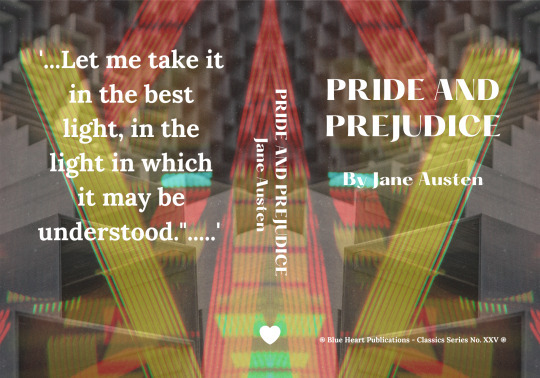
Jane Austen's "Pride and Prejudice" stands as a timeless masterpiece, an exploration of love, social class, and the complexities of human relationships in early 19th-century England. As I delved into the pages of this classic novel, I found myself enchanted by Austen's wit, keen observations, and the enduring relevance of her narrative.
At its core, "Pride and Prejudice" is a love story, but Austen elevates it beyond mere romantic entanglements. The novel unfolds in the world of the landed gentry, where societal expectations and class distinctions shape the characters' lives. Elizabeth Bennet, the spirited and intelligent protagonist, becomes a beacon of Austen's social commentary. The title itself hints at the central themes, highlighting the barriers erected by pride and prejudice that hinder genuine connections between people.
Austen's narrative prowess is evident in her sharp and satirical depiction of the characters. The Bennet family, with its blend of endearing eccentricities and societal foibles, provides a canvas for Austen to explore the absurdities of her contemporary society. Mrs. Bennet's single-minded pursuit of advantageous marriages for her daughters and Mr. Collins's obsequiousness are rendered with a comedic touch, yet they reveal deeper truths about the societal pressures faced by women in that era.
The heart of the novel, however, lies in the dynamic between Elizabeth Bennet and Mr. Darcy. Their relationship evolves amidst misunderstandings, societal expectations, and the prideful assumptions each holds about the other. Austen skillfully weaves a narrative that transcends mere romantic conventions, delving into the intricacies of personal growth, self-awareness, and the transformative power of love.
What sets "Pride and Prejudice" apart is Austen's ability to infuse her characters with authenticity and nuance. Elizabeth, with her sharp wit and strong convictions, emerges as a compelling and relatable heroine. Mr. Darcy, though initially perceived as aloof and arrogant, undergoes a profound transformation, challenging the reader's own prejudices and preconceptions.
Austen's narrative unfolds with a rhythmic cadence, her prose a dance of intellect and emotion. The novel's pacing is deliberate, allowing the reader to savor the unfolding drama and appreciate the intricate web of relationships. The dialogue, filled with social commentary and clever repartees, remains a testament to Austen's literary finesse.
While "Pride and Prejudice" is undeniably a product of its time, the novel's enduring appeal lies in its exploration of universal themes. Austen's critique of societal norms, her championing of independent thought, and her celebration of genuine love resonate across generations. The novel remains a relevant and engaging commentary on the human condition.
In conclusion, "Pride and Prejudice" is a triumph of literature, seamlessly blending romance, social satire, and astute observations on human nature. Jane Austen's legacy endures, and her ability to craft a narrative that transcends its temporal setting cements "Pride and Prejudice" as a timeless classic. As I closed the final chapter, I couldn't help but marvel at Austen's enduring relevance and the indelible mark she has left on the landscape of literary brilliance.
Jane Austen's "Pride and Prejudice" is available in Amazon in paperback 16.99$ and hardcover 24.99$ editions.
Number of pages: 453
Language: English
Rating: 10/10
Link of the book!
Review By: King's Cat
#Jane Austen#Pride and Prejudice#Regency-era literature#Classic romance#Social satire#Elizabeth Bennet#Mr. Darcy#Love and relationships#Class distinctions#Marriage in 19th-century England#Satirical humor#Social commentary#Courtship rituals#Feminism in literature#Romantic ideals#Irony and wit#Manners and etiquette#British landed gentry#Character development#Marriage expectations#Family dynamics#Independent women#Society and morality#Prejudice and perception#Courtly love#Literary realism#Timeless themes#Gentlemanly conduct#Women's role in society#Misunderstandings
2 notes
·
View notes
Text
Polski rower / Polish Bike
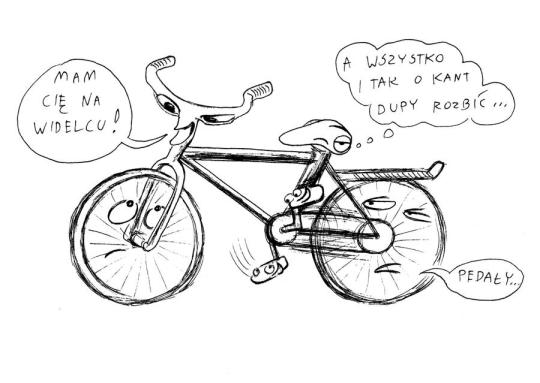
Translation under cut:
"Mam cię na widelcu!" - literally: "I got you on the fork!" means the same as "I got you on the hook"
"Wszystko i tak o kant dupy rozbić" - "everything sucks balls anyway" (literally "can be broken at the edge of your ass")
"Pedały" - literally: "pedals", colloquially: "fags" (I don't know where this association come from but I suspect the word "pederasta" was the origin). Anybody's having fun? - this frustrated rare wheel would gladly underestimate it with an offensive word
Narysowane w 2012 roku. Czemu to wciąż tak pieruńsko aktualne?😑 Najchętniej nazwałabym to "stary rower" i narysowała nowy🤔
#my art#my social satire#social satire#made in 2012#polish idioms#linguistics#polish memes#polska mentalność#polska#bicycle
4 notes
·
View notes
Text
The Twilight Zone is starting in half an hour on SYFY (May 13, 8:00 A.M. EST) in case anybody's interested!

#the twilight zone#syfy#syfy channel#television#coming up#watch party#sci fi#horror#fantasy#dark fantasy#dystopian science fiction#science fiction#sci fi movies#sci fi art#satire#social satire#drawing#art#pop art#modern art#pop surrealism#cult movies#portrait#cult film
7 notes
·
View notes
Text
📖Persuasion📖 by Jane Austen: Listen- & Read-Along, Chapter One
Audio of Chapter One. Read by Karen Savage (Uploaded to YouTube. ~15 minutes, at Normal Speed, and ~20 minutes at 75% Speed) And the same Chapter at LibriVox
Or perhaps you’d prefer the reading by Moira Fogarty (recommended by @rositalagata).
Text of Chapter One, at Project Gutenberg.
(I recommend opening the two tabs simultaneously, to read and listen at the same time; if you want to listen while doing chores, or something, I recommend 75% speed -- Ms. Savage reads quickly.)
Synopsis:
An introduction to the Elliot Family, primarily through the persons of the Patriarch, (Widower) Sir Walter Elliot (a Baron), and his eldest (and Favorite) daughter, Elizabeth, who’s been the social head of the family since her mother died when she was 16. They are both proud of their wealth, rank, and good looks. There is also an explanation of how Sir Walter’s sole heir to his title and estate became estranged from the family (Sir Walter tried to get this young man to marry Elizabeth, but he snubbed the family, and married a wealthy commoner, and Elizabeth is still unmarried at 29). Despite their wealth and estate, they have lived beyond their means, and have more debts than assets.
Can they be persuaded to move out of their ancestral home into someplace less expensive (and less tempting for Sir Walter to spend money)?
Bits that stood out to me:
Oof! That hurt:
Lady Elliot had been an excellent woman, sensible and amiable; whose judgement and conduct, if they might be pardoned the youthful infatuation which made her Lady Elliot, had never required indulgence afterwards.--She had humoured, or softened, or concealed his failings, and promoted his real respectability for seventeen years; and though not the very happiest being in the world herself, had found enough in her duties, her friends, and her children, to attach her to life, and make it no matter of indifference to her when she was called on to quit them.
This feels creepy to me. Does it feel creepy to you?
Elizabeth did not quite equal her father in personal contentment. Thirteen years had seen her mistress of Kellynch Hall, presiding and directing with a self-possession and decision which could never have given the idea of her being younger than she was. For thirteen years had she been doing the honours, and laying down the domestic law at home, and leading the way to the chaise and four, and walking immediately after Lady Russell out of all the drawing-rooms and dining-rooms in the country. Thirteen winters' revolving frosts had seen her opening every ball of credit which a scanty neighbourhood afforded, and thirteen springs shewn their blossoms, as she travelled up to London with her father, for a few weeks' annual enjoyment of the great world.
I dunno. It just gives the vibe of Father and Daughter playing out the roles of Husband and Wife (even if it’s not incestuous, strictly speaking).
~Snerk~ (Their family dynamics in a nutshell):
He had given her some hints of [the extent of their debts] the last spring in town; he had gone so far even as to say, "Can we retrench? Does it occur to you that there is any one article in which we can retrench?" and Elizabeth, to do her justice, had, in the first ardour of female alarm, set seriously to think what could be done, and had finally proposed these two branches of economy, to cut off some unnecessary charities, and to refrain from new furnishing the drawing-room; to which expedients she afterwards added the happy thought of their taking no present down to Anne, as had been the usual yearly custom.
And it was through that passage that it occurred to me that this is a real-world AU retelling of Cinderella, with Anne Elliot in the Cinderella role: doing all the work to try and keep the family going, but getting no respect from her father or sisters. [Anne lives there, in the same house, BTW, so: “the happy thought of taking no present down to Anne...” shows just how little they feel any connection to her.]
---
If I were to give this the Clueless or Bridget Jones’ Diary treatment, and do a modern world retelling, I’d make Sir Walter a Donald Trump type -- but without any of the political ambitions: Someone from a long family line of wealth and privilege, who thinks he’s God’s gift to humanity simply because he’s wealthy and handsome (especially because he’s handsome), and who assumes it’s his duty to live extravagantly, because that’s what people expect of him. But he’s too incompetent to actually keep any of the wealth that’s been handed down to him.
---
Anyway, How often do you want me to post these?
28 notes
·
View notes
Photo

Twitter Tweety, Twitty Tweeter...
12 notes
·
View notes
Text
The Conception Corporation - A Pause In The Disaster (Comedy) (1970) (F...
youtube
It's not necessary to be high on cannabis to fully enjoy this kind of humor, but it's highly recommended.
#Youtube#the conception corporation#conception corporation#comedy#comedy album#comedies#the 1960s#1970#1960s#satire#political satire#social satire#cannabis culture
2 notes
·
View notes
Quote
And in general, the whole wellness craze was a load of crap. According to the wellness ideology . . . people—but mostly women—had the potential to be so much healthier and happier (and thinner) if only they shunned processed sugars and most of Western medicine and got back to all-natural basics, which, not coincidently, cost a lot of money. If you mastered wellness, you could be efficient and centered and smoking hot, for you! All you had to do was drink fancy juice, take a lot of yoga classes, and put a five-hundred dollar jade egg up your vagina, and then you could start having the orgasms your body was meant to have! You'd never disappoint your partner by turning down sex ever again, because you'd be so empowered and energetic that you'd want it all the time!
Laura Hankin, from Happy & You Know It
#satire#wellness#gender roles#expectations#women#social satire#capitalism#wellness craze#humor#quotes#lit#words#excerpts#quote#literature#societal expectations#beauty standards#laura hankin#happy & you know it
4 notes
·
View notes
Photo

221. El Topo (El Topo, 1970), dir. Alejandro Jodorowsky
#cinema#alejandro jodorowsky#brontis jodorowsky#mexican cinema#1970s movies#cult classic#western#drama#father son relationship#rape#murder#racism#revenge#self immolation#dark hero#social satire#catholic mission#desert landscape#surrealism#gore#blood#experimental film#avant garde#allegory#cult director#cinefilos
5 notes
·
View notes
Text

Nu astepta prea mult de la sfârsitul lumii [Do not expect too much from the end of the world] (Radu Jude, 2023)
#Nu astepta prea mult de la sfârsitul lumii#Radu Jude#România#Romania#București#Bucharest#Romanian New Wave#Romanian people#Eastern Europe cinema#Southeastern Europe#Do not expect too much from the end of the world#black comedy film#2020s movies#Ilinca Manolache#Nina Hoss#Uwe Boll#Angela merge mai departe#Lucian Bratu#Tiktok videos#Stanislaw Jerzy Lec#road movie#social satire#capitalism#B&W#manele#time#taxi driver#work place safety#Nicolae Ceaușescu#Romanian society
1 note
·
View note
Text
"Love's Triumph and Social Satire: A Spirited Journey Through 'Pride and Prejudice' by Jane Austen"
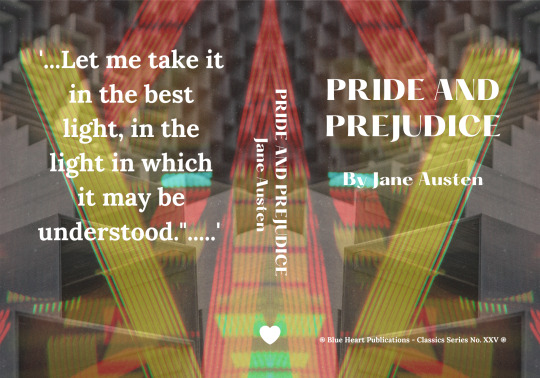
Jane Austen's "Pride and Prejudice" stands as a timeless masterpiece, an exploration of love, social class, and the complexities of human relationships in early 19th-century England. As I delved into the pages of this classic novel, I found myself enchanted by Austen's wit, keen observations, and the enduring relevance of her narrative.
At its core, "Pride and Prejudice" is a love story, but Austen elevates it beyond mere romantic entanglements. The novel unfolds in the world of the landed gentry, where societal expectations and class distinctions shape the characters' lives. Elizabeth Bennet, the spirited and intelligent protagonist, becomes a beacon of Austen's social commentary. The title itself hints at the central themes, highlighting the barriers erected by pride and prejudice that hinder genuine connections between people.
Austen's narrative prowess is evident in her sharp and satirical depiction of the characters. The Bennet family, with its blend of endearing eccentricities and societal foibles, provides a canvas for Austen to explore the absurdities of her contemporary society. Mrs. Bennet's single-minded pursuit of advantageous marriages for her daughters and Mr. Collins's obsequiousness are rendered with a comedic touch, yet they reveal deeper truths about the societal pressures faced by women in that era.
The heart of the novel, however, lies in the dynamic between Elizabeth Bennet and Mr. Darcy. Their relationship evolves amidst misunderstandings, societal expectations, and the prideful assumptions each holds about the other. Austen skillfully weaves a narrative that transcends mere romantic conventions, delving into the intricacies of personal growth, self-awareness, and the transformative power of love.
What sets "Pride and Prejudice" apart is Austen's ability to infuse her characters with authenticity and nuance. Elizabeth, with her sharp wit and strong convictions, emerges as a compelling and relatable heroine. Mr. Darcy, though initially perceived as aloof and arrogant, undergoes a profound transformation, challenging the reader's own prejudices and preconceptions.
Austen's narrative unfolds with a rhythmic cadence, her prose a dance of intellect and emotion. The novel's pacing is deliberate, allowing the reader to savor the unfolding drama and appreciate the intricate web of relationships. The dialogue, filled with social commentary and clever repartees, remains a testament to Austen's literary finesse.
While "Pride and Prejudice" is undeniably a product of its time, the novel's enduring appeal lies in its exploration of universal themes. Austen's critique of societal norms, her championing of independent thought, and her celebration of genuine love resonate across generations. The novel remains a relevant and engaging commentary on the human condition.
In conclusion, "Pride and Prejudice" is a triumph of literature, seamlessly blending romance, social satire, and astute observations on human nature. Jane Austen's legacy endures, and her ability to craft a narrative that transcends its temporal setting cements "Pride and Prejudice" as a timeless classic. As I closed the final chapter, I couldn't help but marvel at Austen's enduring relevance and the indelible mark she has left on the landscape of literary brilliance.
Jane Austen's "Pride and Prejudice" is available in Amazon in paperback 16.99$ and hardcover 24.99$ editions.
Number of pages: 453
Language: English
Rating: 10/10
Link of the book!
Review By: King's Cat
#Jane Austen#Pride and Prejudice#Regency-era literature#Classic romance#Social satire#Elizabeth Bennet#Mr. Darcy#Love and relationships#Class distinctions#Marriage in 19th-century England#Satirical humor#Social commentary#Courtship rituals#Feminism in literature#Romantic ideals#Irony and wit#Manners and etiquette#British landed gentry#Character development#Marriage expectations#Family dynamics#Independent women#Society and morality#Prejudice and perception#Courtly love#Literary realism#Timeless themes#Gentlemanly conduct#Women's role in society#Misunderstandings
3 notes
·
View notes